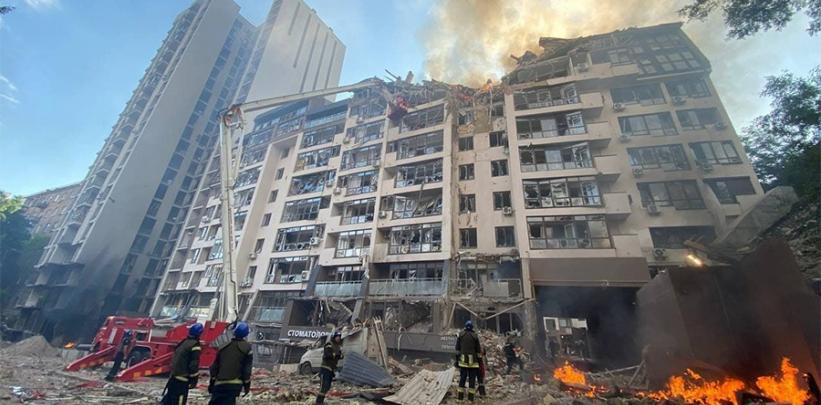Unitec scientists reach out to support Ukrainian colleagues
Researchers across Ukraine are racing against time to move, hide or otherwise protect valuable scientific collections in museums and other research institutions, with education and research continuing remotely wherever possible.
On 24 February 2022, when Russia invaded Ukraine, the civilian casualties and senseless destruction of towns and cities caused outrage across the world. The conflict continues to cause ongoing devastation in Ukraine, with many civilian injuries and deaths.
What is less known is the impact on scientists and scientific research in the country. Buildings at several of the country’s critical research institutions have been partly or completely destroyed by Russian attacks, scientists have become refugees, and universities have been badly damaged.
Researchers across Ukraine are racing against time to move, hide or otherwise protect valuable scientific collections in museums and other research institutions, with education and research continuing remotely wherever possible.
An example of this is the Ukrainian Botanical Journal, established in 1921, and published bi-monthly by the M.G. Kholodny Institute of Botany, National Academy of Sciences of Ukraine. Despite the war, which at times has hit Kyiv, Professor Sergei Mosyakin Director of M.G. Kholodny Institute of Botany, and journal editor Dr Vera Hayova continued to publish the journal.
Associate Professor Peter de Lange from our School of Environmental & Animal Sciences (EAS), started working with the journal through his involvement with Professor Sergei Mosyakin, a noted plant expert. Dr de Lange has been an Associate Editor of the Ukrainian Botanical Journal since 2021, and is undoubtedly its most distant editorial board member.
Dismayed at the Russian invasion and the hardships the researchers and Ukrainians are undergoing, Dr de Lange called on his network of world scientists to support the Ukrainian Botanical Journal.
Impressed with their dedication to the cause of science, even when a missile took the front off Mosyakin’s flat, Dr de Lange decided to do something different—canvas the world for paper submissions to the journal. While it may not seem much, showing the world that science can continue even in times of such violence and uncertainty seemed a good idea.
 Among the many offers of papers came one from Associate Professor and Head of School (EAS) Dr Dan Blanchon and Research Associate Andrew Marshall. Their paper published in June, is co-authored with Internationally Respected Lichenologists Dr(s) Robert Lücking (Botanischer Garten, Freie Universität Berlin, Berlin, Germany) and André Aptroot (Laboratório de Botânica / Liquenologia, Instituto de Biociências, Bairro Universitário, Mato Grosso do Sul, Brazil). (Articles are linked below)
Among the many offers of papers came one from Associate Professor and Head of School (EAS) Dr Dan Blanchon and Research Associate Andrew Marshall. Their paper published in June, is co-authored with Internationally Respected Lichenologists Dr(s) Robert Lücking (Botanischer Garten, Freie Universität Berlin, Berlin, Germany) and André Aptroot (Laboratório de Botânica / Liquenologia, Instituto de Biociências, Bairro Universitário, Mato Grosso do Sul, Brazil). (Articles are linked below)
It documents five lichens previously unrecognised from New Zealand. Dr de Lange along with Luzie Schmid (an international student from Regensburg, Bavaria, Germany studying in the Bachelor of Applied Science at Unitec) and Dr Jian Wang (Queensland Herbarium, Department of Environment and Science, Brisbane Botanic Gardens, Queensland, Australia) started the cause with two papers published in April 2022 on the taxonomy of the Australasian grass genus Pentapogon and the typification of a New Caledonian daisy genus Pytinicarpia.
For the June issue, Dr De Lange prepared a paper on Senecio with Associate Professor Dr Pieter Pelser of the University of Canterbury and their former PhD student, Dr Chia-Sin Liew, who now works from the Centre for Biotechnology, University of Nebraska-Lincoln in the US.
 All of these papers have been offered in the cause of freedom of scientific endeavour and through extension peace for the Ukrainian peoples. The authors believe that in this day and age wars like that in Ukraine should not be happening, while New Zealand is far from that conflict, the events still touch on our lives, be it through changes to our economy, stories of violence, or our links to our friends over there.
All of these papers have been offered in the cause of freedom of scientific endeavour and through extension peace for the Ukrainian peoples. The authors believe that in this day and age wars like that in Ukraine should not be happening, while New Zealand is far from that conflict, the events still touch on our lives, be it through changes to our economy, stories of violence, or our links to our friends over there.
Science is an international language, so the continued publication of a Botanical Journal that had its centenary last year, in a country so freshly emerged from the iron curtain is remarkable. People like Hayova and Mosyakin, and their team of editorial staff are heroes, continuing to publish high quality research is testimony to the cause of science in the face of unspeakable conflict.
Kia kaha Ukraine.
Read the journal articles here:
